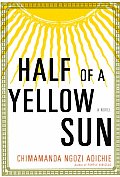 Chimamanda Ngoze Adiche sets her Half of a Yellow Sun in the midst of a war of secession as Biafra and her Igbo people try to separate themselves from Nigerian persecution and tyranny. The title image refers to the figure on the flag of a nation that never quite realized its sovereignty.
Chimamanda Ngoze Adiche sets her Half of a Yellow Sun in the midst of a war of secession as Biafra and her Igbo people try to separate themselves from Nigerian persecution and tyranny. The title image refers to the figure on the flag of a nation that never quite realized its sovereignty.
My ignorance of Africa, her history and geography, is, to my shame and chagrin, vast. All I remember of Biafra is the 1960’s pictures of starving children on ads asking for contributions. Worse than my ignorance is my forgetting about the whole thing when the ads quit appearing. I didn’t know or care to know whether Biafra was or is a country or a region or if those kids ever got fed. So, Yellow Sun does something to cure my ignorance. (BTW, it lost the war so is not a country.) By coincidence (or not?) a group my wife belongs to heard from a Nigerian immigrant war stories that duplicate the ones Adiche tells of her fictional family. Also, the book became a film last year. Nominated for nothing, one reviewer said that the movie sacrificed the war for the sentimental romance part of the story. Not an uncommon sin for Hollywood, but more than unfortunate in this case.

At its essence, Yellow Sun is the story of two sisters, Olanna and Kainene, twins that don’t look it, raised in comfortable circumstances, well-educated, whose lives are shredded when their Igbo tribal minority becomes the target of hate and violence. Other Nigerians (mainly those of the Hausa tribe) decide that the igbo’s have become too powerful and rich–sort of like the accusations against Jews in Europe and elsewhere–far out of proportion to their numbers. Persecution is rampant. The Igbo’s stake out a territory and set about building a nation where they can be safe. The dominant Nigerian population objects. Game on.
The families flee from home after home, town after town, as the Nigerians march in like Sherman through the south. For three years during the 1960’s, the war rages. Our prosperous sisters and their families are reduced to rags and starvation. Adiche describes all this with excruciating clarity. However, she makes this a story of her characters contending with the most extreme imaginable circumstances, not a story of the circumstances themselves. And that’s where the power of her tale lies.
Olanna must deal with her husband’s infidelity, agreeing to raise the child he fathered in his adultery, and with the decimation of his character as the war dooms his revolutionary hopes and dreams. She must deal with intense conflicts with her sister not only over shared lovers but with their very philosophy of life and love. She must deal with the vulnerability of her husband’s houseboy, the beloved Ugwu, for whom we care as much as anyone else in the story, who at any moment could be snatched into service by the Biafran military, desperate for recruits.
The novel is epic. Different in every way from Adiche’s award-winning Americanah, thus proving to me that she’s even more of a writer than I thought. Able to handle any subject anywhere any time with inspiring excellence. The lady’s a writer, and Yellow Sun is, I daresay, a classic.
\
